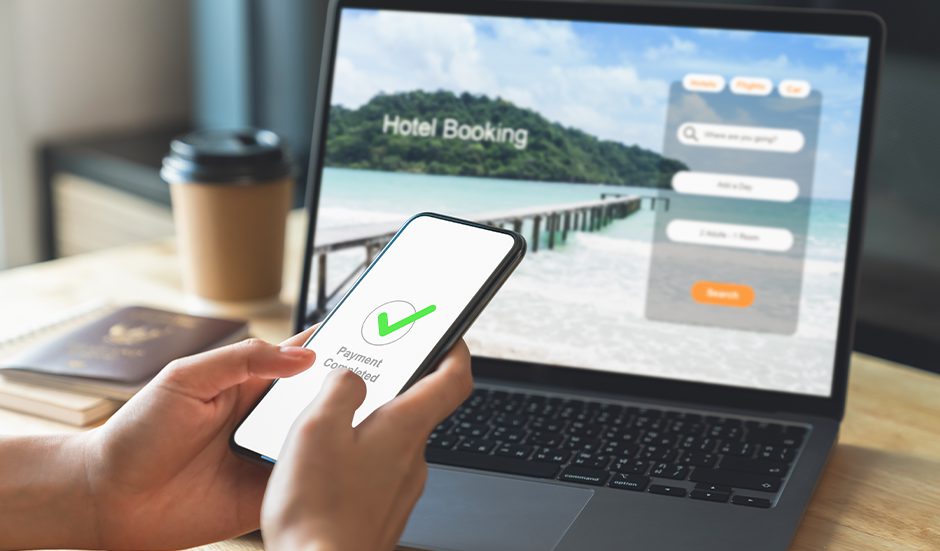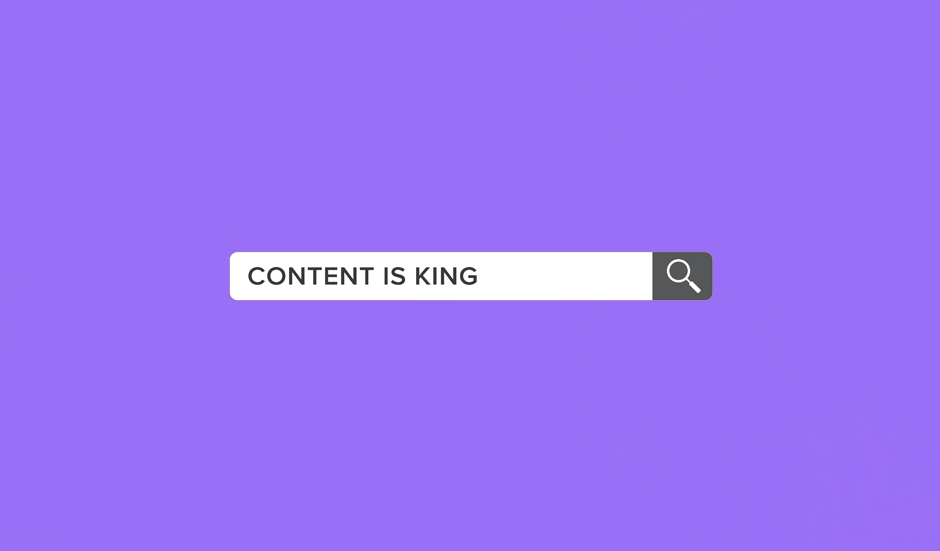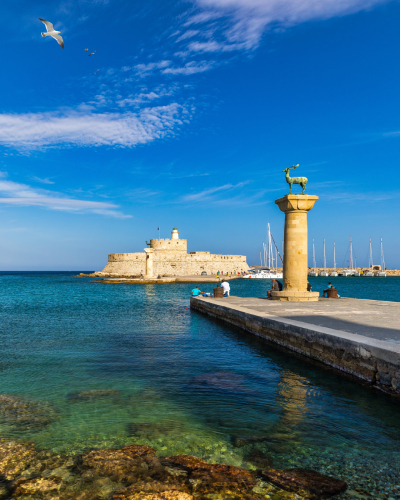Top Digital Trends in Hospitality for 2025

Table of Contents
Introduction
As we close out yet another transformative year, we are proud to mark 12 consecutive years of Panadvert’s research and publication on emerging trends in hospitality marketing. Over this period, we have witnessed the evolution of the sector, observing a distinct shift towards technical and technological advancements that are reshaping how hotels interact with their guests, optimize operations, and drive bookings. With the dynamic rise of AI across revenue management and various other aspects of hospitality, these technological shifts are more impactful than ever.
With this in mind, we are excited to share our insights on the top trends set to define the digital landscape of hospitality marketing in 2025. Keep an eye out for these innovations—they are poised to revolutionize the way the hospitality industry connects with and serves its clientele.
1. The Era of Artificial Intelligence (AI)
Artificial Intelligence (AI) is ushering in a new era for hospitality, transforming everything from guest interactions to strategic decision-making. AI offers a wide range of applications that enhance operational efficiency, personalize guest experiences, and improve forecasting.
Here are some of the most impactful uses of AI in the hospitality industry:
- AI and Predictive Analytics: AI-driven predictive analytics enable hotels to forecast future demand, anticipate traveler behavior, and adjust advertising strategies accordingly.
- Personalization for Enhanced Guest Experience: AI allows for deeper personalization, tailoring offers, services, and even on-site experiences based on each guest’s preferences and previous behavior. This not only improves guest satisfaction but also fosters loyalty, as visitors feel their needs are understood and anticipated.
- Chatbots and Virtual Assistants: Advanced AI-powered chatbots provide instant, 24/7 support for guests, handling queries, booking requests, and service adjustments seamlessly. Virtual assistants help streamline operations, reducing the need for human intervention in routine tasks and freeing staff to focus on personalized, high-touch interactions.
- Review Management and Sentiment Analysis: Analyzing guest reviews to gauge satisfaction levels and identify areas for improvement.
- Optimized Staffing: Predicting demand to allocate staff efficiently, ensuring high service quality while maintaining cost-effectiveness.
- Artificial Intelligence Revenue Management Systems: Artificial Intelligence Revenue Management Systems are able to aggregate various data streams—market trends, PMS data, competitor rates, event schedules, and even weather patterns—to offer comprehensive insights into hotel and market conditions. This data integration enables real-time pricing optimization through an automated, machine learning pricing engine which makes rate recommendations and allows hoteliers to tailor their pricing strategies using AI-powered analysis. Such systems – like the one offered by Hotellistat – enhance revenue by dynamically adjusting prices based on a variety of factors, ensuring that hotels remain competitive while maximising their profitability. The aforementioned Artificial Intelligence Revenue Management is part of an emerging trend that is gradually developing and is expected to dominate in the coming years, pertaining to “Automated Sales Technology”.
2. Social Commerce: A New Revenue Stream for Direct Hotel Bookings
Social commerce has quickly risen to become one of the top trends in hospitality marketing for 2025, revolutionizing the way hotels engage with potential guests and drive direct bookings. Over the past year, we observed a significant increase in revenue generated from social media channels, as more consumers are now making bookings directly through platforms like Instagram, Facebook, and TikTok.
Social media platforms have evolved from simple engagement tools into robust booking channels. By leveraging targeted ads, influencer partnerships, and engaging visual content, hotels can connect with potential guests in real time, showcasing their unique offerings in a visually compelling way. This direct interaction not only enhances brand presence but also minimizes the need for third-party booking channels, reducing commission fees and improving revenue margins.
For a deeper exploration of how social commerce is transforming hotel bookings and how to capitalize on this trend, see our dedicated case study on the topic here.

3. Performance Marketing
Performance marketing and analytics harness the power of data-driven insights to tailor marketing campaigns and measure their success accurately. Performance marketing in hospitality begins with a business intelligence approach, where big data from various sources and market trends are analysed to craft impactful strategies aimed at increasing hotel bookings, with a sharp focus on direct bookings.
For yet another year, Google continues to lead as the most powerful channel for driving direct bookings in the hospitality sector. There is a wide array of performance channels—including Google Ads, Microsoft Advertising (Yahoo/Bing), Meta Ads, Expedia Travel Ads, Yandex, Baidu, and CPC in social media platforms such as Facebook, Instagram, or TikTok, to position hotels favourably in the market and effectively attract potential guests.
A major development in 2025 is the transition of Google’s MetaSearch channel within Google Hotel Ads from a commission-based model to a Cost-Per-Click (CPC) structure.
Additionally, Google’s Consent Mode and the growing trend toward Cookieless Advertising are redefining how hotels track and target their audiences while ensuring compliance with global privacy regulations.
This method, demonstrated by Panadvert’s campaign for a boutique hotel in Santorini that generated over 2.2 million euros directly from Google Ads only, highlights the power of targeted, data-led advertising in enhancing profitability and guest relationship management.
4. Enhanced Content Strategy (Content is Still King)
Creating high-quality content remains essential for hotels, as it not only attracts potential guests but also strengthens brand identity and boosts Average Daily Rate (ADR).
Engaging visuals, captivating videos, and well-crafted storytelling, as well as user-generated content, help communicate the unique value of a hotel, drawing in the ideal audience while enhancing the property’s perceived value. This strategic focus on premium content ensures that each piece aligns with the brand’s image, fostering a deeper connection with guests and ultimately contributing to higher revenue.
Here is an award-winning content production case study by Panadvert: A Journey Through the Senses: Panadvert’s Content Production for Milos Breeze Boutique Hotel. This project helped the hotel significantly boost its ADR and direct bookings.

5. Shift from Traditional Tour Operators to Online Travel Agencies (OTAs)
Traditional tour operators are seeing a steady decline in market share as travelers increasingly prefer the flexibility and immediacy of Online Travel Agencies (OTAs) like Booking.com, Expedia, and more. This shift empowers hotels with greater control over pricing, availability, and brand presentation, while reducing dependency on high-commission tour operator contracts. OTAs also provide valuable data insights, enabling hotels to adapt their offerings and strategies in real time to meet evolving demand.
However, with OTAs growing in influence, a strong online presence has become essential. Quality digital marketing, content creation, and a compelling online image are now critical for hotels to effectively capture this new market landscape and reach a global audience directly.
6. Market Positioning Systems (MPS): Optimizing Competitive Pricing
Market Positioning Systems (MPS) are innovative tools for hotels seeking to understand their position within the competitive landscape. By analyzing factors such as pricing, ratings, and brand popularity, MPS provide valuable insights into a hotel’s market positioning, revealing whether it is priced too high or too low relative to market demand and dynamics.
MPS Tools offer a visual representation of a hotel’s pricing relative to the overall market, including all hotels within the same category (in the Region, City or even in the entire country). It helps identify whether a hotel is appropriately priced based on quality and its position within the broader market landscape.
Market Positioning Systems (MPS) bridge the gap between Rate Shoppers and Revenue Management Systems (RMS), helping hotels evaluate their market position and fine-tune pricing strategies. A prominent example of such a system is HotelInsider.
7. Influencer Marketing: A Direct Booking Catalyst in 2025
Influencer marketing has emerged as a pivotal strategy for hotels, as highlighted in our recent article “How to Choose the Right Influencers for Your Hotel”. In 2025, influencer marketing remains a key approach, blending authentic storytelling with measurable results. Platforms like Expedia have introduced initiatives such as Travel Shops, which allow influencers to curate and monetize travel recommendations directly within Expedia’s app and website, bridging the gap between social media inspiration and booking actions.
Beyond driving bookings, influencers also serve as valuable content creators for hotels. Their ability to produce high-quality, engaging visuals and narratives provides hotels with a steady stream of creative assets that can be leveraged across marketing channels. This dual role as both promoters and content creators makes influencers an indispensable part of modern hospitality marketing strategies.

8. Hyper-personalization
By analyzing data on guest preferences, past behaviors, and real-time interactions, hotels can tailor every aspect of the guest experience, from room settings to food options. Examples of this hyper-personalization include:
- Mini Bar Selection: Stocking items that align with guests’ preferences, age, target group.
- Flexible Check-in/Out Times: Offering times that fit guests’ schedules.
- Food Preferences and Allergy Awareness: Customizing menus to meet dietary needs.
- Special Occasions: Celebrating birthdays, honeymoons, or anniversaries with personalized touches.
By providing these examples and many more tailored services, hotels can create memorable, individualized experiences that foster loyalty and enhance guest satisfaction.
9. Dynamic Website Personalization: Tailoring Content to Individual Guests
Following the previous trend, Hyper-personalisation also extends to the realm of digital experiences, with new personalized website systems dynamically adapting content based on target groups.
Dynamic website personalization is an emerging trend in hospitality, enabling hotels to customize online content based on specific triggers such as booking engine selections or referral links. By identifying the persona or target group of each visitor, hotels can present tailored content that resonates with individual preferences. For example: Business Travelers, Leisure Travelers, Families, Wellness Seekers, Seasonal Guests (e.g., Winter Ski Enthusiasts, Christmass period, Summer Beachgoers etc)
One example of this technology is Hotelwize.
10. Cybersecurity in Hospitality
In the hospitality industry in 2025, Cybersecurity is paramount, as hotels accumulate vast amounts of sensitive guest data. Implementing sophisticated cybersecurity protocols is not just a technical necessity but also a core aspect of customer service in the digital age to protect against data breaches and maintain guest trust.
Panadvert’s ebook “The Ultimate Guide to Cybersecurity for Hotels“ is an essential read to understand these practices comprehensively as it offers an in-depth look at the best practices and strategies for securing hotel data and systems. It is a valuable resource for hoteliers looking to fortify their current cybersecurity and safeguard their establishment in an era where digital security is as critical as the physical safety of guests.
11. Self-Service Mobile Solutions
With the rapid adoption and familiarity of mobile phones, customers increasingly expect digital options for their service needs. Self-service mobile solutions provide an efficient and personalized experience, enhancing satisfaction while reducing the need for in-person interactions.
Examples include:
- Mobile Check-In and Check-Out: Faster and contactless guest experience.
- Keyless Room Entry: Digital room keys via smartphone apps.
- In-Room Services via Mobile Apps: Control room settings, order services.
- Mobile Concierge Services: Real-time recommendations and bookings.
- F&B Pre-Ordering: Order meals and drinks via mobile devices.
- Contactless Payments: Seamless and secure payment options.
- Digital Itineraries and Travel Guides: Personalized travel plans and guides.
- Mobile Loyalty Programs: Track and redeem rewards easily.

12. Blockchain for Secure Transactions
Blockchain technology is revolutionizing the hospitality industry by offering unparalleled security, transparency, and efficiency. By enabling tamper-proof and encrypted transactions, blockchain builds trust between hotels and guests, reducing dependency on third-party intermediaries.
The integration of smart contracts automates booking processes, ensuring accurate, timely payments and minimizing disputes. Moreover, accepting cryptocurrencies through blockchain can attract tech-savvy travelers, opening new revenue streams. This technology empowers hotels to enhance their direct sales strategy by offering a seamless, secure, and transparent booking experience while simultaneously reducing costs and increasing guest loyalty.
Hospitality 2025
Top digital trends defining the future of guest experience and revenue.
The Core Shift
2025 marks the end of generic marketing. Success now relies on AI-driven precision, social commerce, and owning the guest relationship directly.
AI & Hyper-Personalization
- Predictive analytics for tailored stays
- Instant 24/7 service via chatbots
- Dynamic pricing engines
Social Commerce
- Direct booking via Instagram/TikTok
- From awareness to conversion
Performance Evolution
- CPC Models (Google Hotel Ads)
- Reduced OTA Dependency
Dynamic Websites
- Real-time content adaptation
- Location-based offers
Premium Content
- High-end visual storytelling
- Drone & lifestyle photography
Cybersecurity
- Robust data protection
- Building guest trust
Strategic Takeaway
The winning formula for 2025 is owning the guest data. By leveraging AI and social commerce, hotels can bypass intermediaries, personalize the journey, and significantly increase direct revenue.
Choose the Right Influencers for your Hotel
Table of Contents The Four-Step Strategy for Effective Influencer Marketing of Hotel Properties The
Rhodes: A Detailed Tourism Assessment
A data-driven look at Rhodes’s tourism trends, demand growth, and the factors that make it a stabl
Halkidiki: An Extensive Destination Analysis
A data-driven look at Halkidiki’s tourism trends, demand growth, and the factors that make it a st



